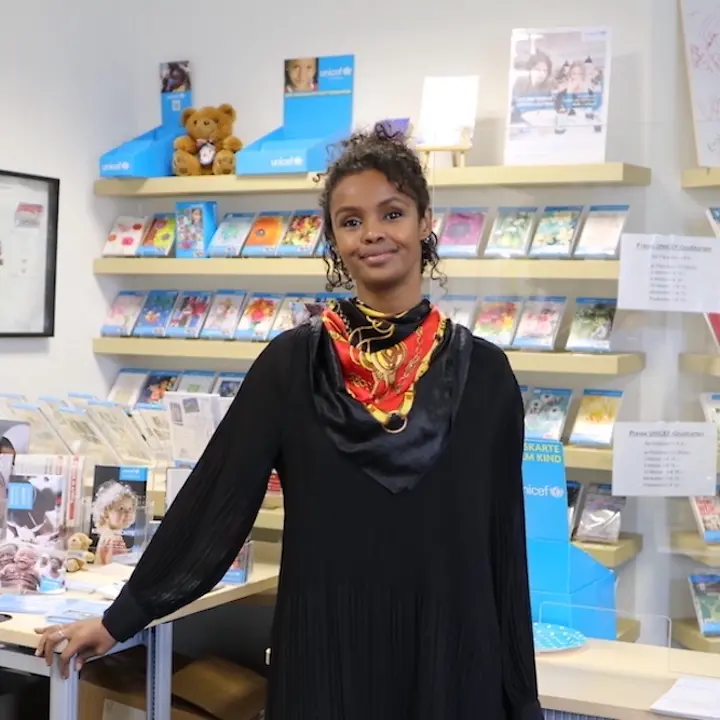
Interview with Ilwad Elman
In October 2020 the Canadian-Somali human rights activist Ilwad Elman traveled to Berlin, where she was awarded the German Africa Prize 2020 for her tireless commitment in Somalia. Being forced to leave her homeland at a very early age and emigrating with her family to Canada, she is now one of the leading voices for children and women rights in Somalia. At the Elman Peace and Human Rights Center she and her mother offer help for victims of sexual violence and work for the reintegration of former child soldiers. Due to a long-standing cooperation partnership, she feels a special bond with UNICEF, which is why she met with the UNICEF working group in Berlin during her stay in the German capital to talk about her passionate dedication and the progress of the civil war-stricken country in the Horn of Africa. Although Somalia still has a long way to go, the interview with Ilwad Elman provides reason for hope.
After growing up in Canada, you returned to Somalia at the age of 20, where you have been working as a peace and human rights activist ever since. What made you decide to give up your secure life in Canada and follow this path?
First of all, thank you very much for having me. It's an honour for me to be here as well and to start my trip in Berlin with UNICEF – one of my organization's greatest partners actually. My parents are both human rights activists. Although it was never prescribed for me or either of my sisters to come back to Somalia – to essentially have the torch of activism passed down to us – it was always something in the background knowing that my father died for the work that he believed in, which is on creating and promoting human rights for all. My mother left my sisters and I in Canada when I was only 16 to continue that legacy and that commitment to creating a more progressive society for others. In 2010, I got that call to return, too. At first, it turned out to be a desire to understand why she returned to Somalia when my sisters and I still needed her in Canada.
The only depiction or narrative that I saw of Somalia at that time was one of conflict, murders, extreme uncomfort, hunger and insecurities.
I wanted to see what the conditions were like in Somalia. When I arrived there, I realized that so many other people needed my mother in the same way that we needed her. Hundreds of other children were calling her mother as well. I noticed that she was creating a real impact and I wanted to be part of that. It was supposed to be a 3 month summer vacation visit, turning to 10 years and I found purpose there. What made me stay was seeing that the country has a huge disparity between those who are in the majority and those who are in leadership positions. 78% of the population is under the age of 30. 44% of those are under the age of 15. Yet the leadership, all the decision making does not reflect the society. There was a huge chasm in the role that young people could play in changing their circumstances and their actual involvement (Anm. d. Red.). So I stayed because I saw that the services, legislation and the direction of the country was not reflective of the majority population.
Somalia has been in a civil war since 1991. How would you describe the current political situation? Have there been improvements since you returned to Somalia in 2010?
From the outside, I often think Somalia appears as a heavily conflicted country, ready to spiral back into its height of conflict in the nineties. But Somalia I see today is one that is maturing. It's very different from when I first went back. Just to give you a better understanding, I moved to Mogadishu when I first returned and of the 17 districts at the time, only two were controlled by the government. The rest were controlled by a terrorist organization.
The war in the frontline that you hear of was literally in my backyard.
There was no mobility, no communication, no internet. Today it's very different. However, from a stability and security perspective, it could be argued that it was safer 10 years ago, because then at least you knew which areas to avoid, whereas now, anywhere where more than 5 people gather can be a target. So the unpredictability of that guerilla-kind of warfare, in itself, provides a lot more insecurity. However I think that things have improved significantly. The issues that we were advocating 10 years ago, like the use of children in armed conflict being ended, was not a discussion that was on the table. Sexual violence was rampant and the president at the time in 2010 was openly denying that this was even happening, whereas now, we're talking about legislation. We are currently struggling to find the right legal framework, but that conversation is happening to prevent this.
Do you think that traditional media outlets are depicting the true reality in Somalia – with all of its positive developments from the recent years? What role do traditional and social media play in bringing Somali issues into the international spotlight?
I think that international media has a long way to go in covering the realities. But what's new now is that local communities, young people in particular, are not waiting for their story to be told for them. They are using social media to harness the digital age that we're in right now to tell their own stories. One such moment that stands out very clearly for me is the terrible attack that happened at Lido Beach in 2014. Of course all the images that made it into the mainstream media were very undignified depictions of children and women whose bodies were completely on display. So to push back, young people used hashtags and tweeted Lido Beach photos instead. During that big story, all of the mainstream (Anm. d. Red.) images that you would have seen on social media were instead co-opted by beautiful photos of them hanging out at the beach or being at restaurants. I think that was also their kind of way of reclaiming their own narrative. We also use social media for our work, on the one hand to activate our supporters at home and abroad and to show people that there are a lot more similarities than they may think is possible.Someone that has never been to Africa or has never visited a conflict zone may not necessarily relate with the issues that we advocate for, but they do gravitate towards this culture or the use of creativity, art, music or sports.
Universal languages and social media have become the avenue to actually send out those messages.
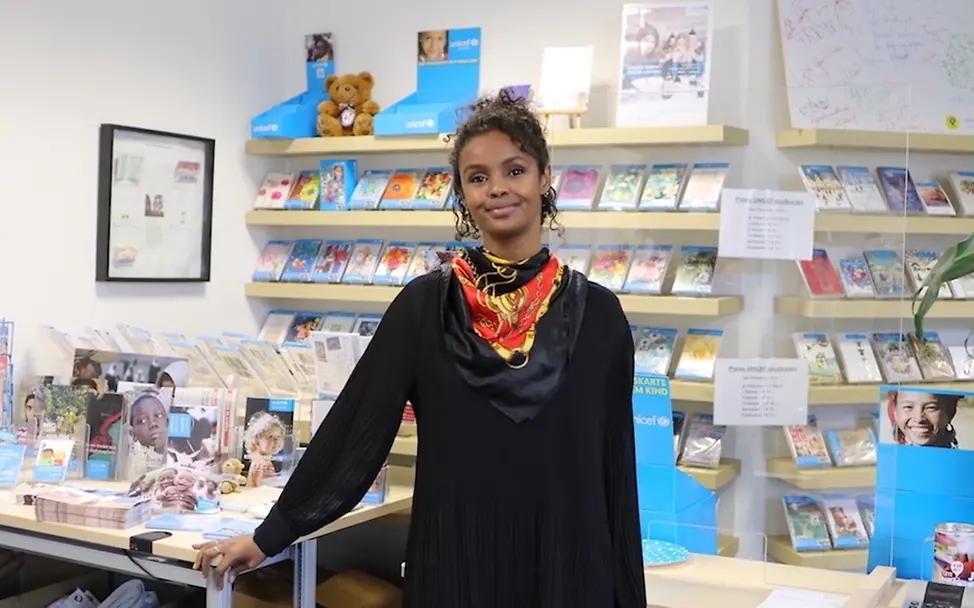
Ilwad Elman is one of the strongest voices in Somalia and Africa advocating for children's and women's rights.
© UNICEF BerlinWomen’s rights and gender-based violence
In Somalia, rape, female genital mutilation and forced marriages are common for many women and girls. In 2010, you founded "Sister Somalia", the first rape crisis center in Somalia. How do you help these women and girls?
In 2010, reports of violence against women and girls increased on an unimaginable scale. It also coincided with a terrible humanitarian crisis, where more than 350,000 people died. They were all flocking from the regions to the capital for food and shelter. But in that period we also saw militiamen and armored vehicles camped outside the IDP camps waiting to loot the aid that was coming. And they raped women and girls as they pleased. There were reports about it. There were announcements and condemnations, but no one was actually doing something. There wasn't a place that someone could go to, if they had been victimized. So we started offering a very humble room in one of our offices and then mobilized the community of supporters from the diaspora, and on a budget of $5,000 we were able to fly in post-exposure prophylaxis treatments. That resulted in more women coming, some of them actually sleeping on the floor of the office. We began to document these stories and at that moment what we saw was that women were not only asking for assistance, but wanted to use their voice to prevent this from happening.
That generated conversations about gender-based violence that never existed before.
Their stories started a momentum that couldn't be stopped anymore. So we also rode that wave and did a lot of press on it. We got a lot of backlash, but more support. That initial facility providing only the bare basics, i.e. sex social counseling and health support, then resulted in more people hearing about this open secret in society. Again, we had the president at the time putting together a press statement, saying that any agency that's working on sexual, gender-based violence is bringing shame to the country, that this doesn't happen here. After some challenges, we got support from other organizations that saw the proof of concept now and how there was a need for facilities like this. We scaled our interventions from Mogadishu to more acute areas outside the capital to decentralize the services, because we saw that some women were even being victimized on their way to get support. Gender-based violence in Somalia went from (in a short period of 10 years) being recognized as something that doesn't happen, to now understanding that it happens, although prevention is still lacking because it remains taboo within traditional cultures.
Gender-based violence is still viewed singularly as rape and does not yet include domestic violence, female genital mutilation or emotional abuse.
So there's still a long way that we need to go. I'm encouraged now because we see there are women joining legislation who are part of the political movements trying to create infrastructure and legal frameworks to protect women and girls. But it first had to start with making these services available. We sometimes saw the same women or girls two or three times because we were sending them back to an environment that was not safe for them. And that grew our work as well – it's not just to respond to each woman's individual recovery but also to create a wider system of support around the woman or girl to make sure that she's going back to the community that can support her, protect her, even give her financial independence and freedom so that she can also relocate and move. So it's a long way to go, but I'm encouraged again by the young population of women and girls that are not letting the social constructs decide for them, of what is a good woman or a good girl.
When you started talking about sexual violence, your center was stormed because some parts of the society convicted you of disrespecting Somali culture and religion for addressing issues like rape. What is the current legal situation?
We've seen vast improvements, but then there are some horrific setbacks as well to happen. Over the last couple of years, we went from a significant shift of having less than 10% women in the National Assembly to a huge spike of women – nearly 24% in parliament, being able to advocate for women and girls. We had the first initiative of women in human rights. In 2018, the first sexual offenses bill was adopted and the penal code was revised. All of these things indicated that we were not just gonna respond to sexual violence anymore, but actually legislated the prosecution of perpetrators. Up to very recently, the sexual offenses bill was completely destroyed and a sexual intercourse bill was being proposed. While the sexual offenses bill was planning to hold perpetrators accountable and prevent such crimes, the sexual intercourse bill took a very nasty turn by starting to govern female bodies and essentially legalizing child marriage. When there is a lot of progress very fast, it also challenges the status quo in a way that they feel like they have to be much more regressive and patriarchal and put measures into place that almost seem very contradictory to the progress that has been made. We're facing this dilemma right now in Somalia.
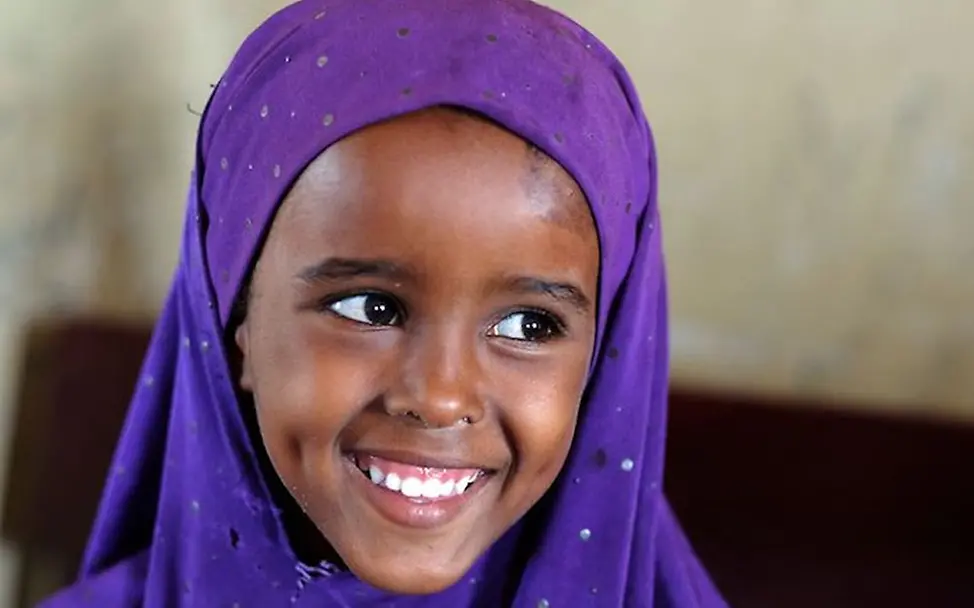
Ilwad Elman is committed to protect as many girls and women as possible from any kind of gender-based violence or abuse.
© UNICEF/UN0199837/RichWhat is the role young men play in these societal shifts?
We don't look at men and boys as just a problem, but also part of the solution. We can't just talk about women's and girls' issues in silos, without also looking at the environments in which they are supposed to evolve and grow. We've been looking at how to include boys and men in means that are already comfortable within the society. So we engage legislators to talk about the rights of women and girls in mosques, we engage young men and boys through sports. We have a program called »Coaching boys to men«, where we leverage sports and the unique relationship between a coach and a young boy to not only teach sports but also how to be gender allies, how to be protectors and partners in the community, including for women and girls. We found those avenues to be really successful. We also partner with young influencers and artists to show that it's cool to be conscious, that a real man doesn't rape and beat a woman or girl.
This also goes on to our work with female genital mutilation. We did a study a couple of years ago where we looked at women that have undergone female genital mutilation and had children, girls, who had also undergone female genital mutilation and did not have children yet and then also very young girls. We asked them about all the negative health impacts and how they felt. They went on to list everything we know about the challenges that come with female genital mutilation. And then we asked them if you had a daughter would you do it again.
More than 88 percent would consistently say “Yes, we’ll continue the cycle”.
Mostly just because it's always been done that way and they assume that a woman who hasn't undergone genital mutilation wouldn't find a husband and wouldn't be accepted in society. What are examples of good women that haven't had FGM and there was no one they could actually point to. We realized that there was a chasm in role models. So then we began partnering with young men and eligible bachelors and started a campaign based on 3 pillars. The Somali federal government in the provisional constitution has actually banned FGM. So, first of all, constitutionally it is illegal. Second, religiously it is not a requirement. And third, you have these young men that they think they're doing it for, now saying: »Don't do it for us.« That was a really successful campaign. The boys went to different IDP communities, different schools and it was interesting to see young men also taking the charge of that conversation.
There is still a long way to go. In the capital the total mutilation is considered very taboo now, but there is still cutting happening.
In the regions we're still seeing that young girls are dying today because of female genital mutilation.
It is a reminder for us why we need to decentralize our services. It has to be a combination of everything: delivery of service, individual recovery, but then also cascading that into the changing of social norms. So we put a lot of emphasis on education, community empowerment and awareness raising.
Help for former child soldiers
Your mother and you run the Elman Peace and Human Rights Center, where you revived your father's initiative »Drop the gun, pick up the pen«. How do you help former child soldiers in a sustainable way so that they become and remain part of society?
First, we show the children themselves, the communities that they are coming from and the government that's handing them over to us that they are children and children deserve to be treated as children. When they're removed from military bar kind of environments they can be children again.
At the most basic level of intervention the core of it is really love, attention and guidance and that is what children need no matter what kind of background they came from.
With partners like UNICEF we are actually able to provide a home for former child soldiers. The care centers have staff living with them, and we offer medical and psychological care, counseling and recreational activities. The biggest challenge of course is that for children who are leaving groups like Al-Shabaab there is no life after Al-Shabaab. Either you are considered a government informant and become an enemy to Al-Shabaab, resulting in reintegration into the community with a target on your back. Or the government and armed factions still look at the children as part of Al-Shabaab and then you have another target on your back. You don't have a legal framework that actually recognizes them as those that have gone through a reintegration process.
Basically, we're trying to return people to a society that isn't accepting them. So part of staying in these residential facilities is also taking them out of the mainstream spotlight, allowing them to create new positive identities and connecting them with support systems within the community that can help to smooth the transition out.
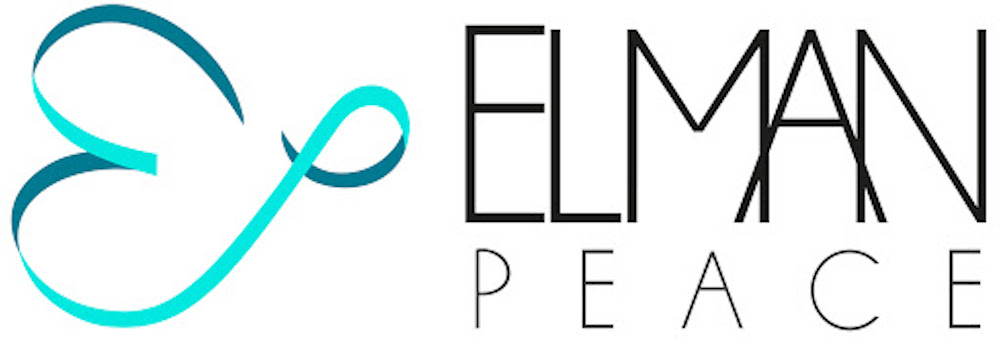
At Elman Peace Center Ilwad and her mother help reintegrate former child soldiers into the Somali society.
© Elman Peace CenterWe then put them into socio-economic reintegration interventions so that they can learn new skills and enter the formal education system which will allow them to become independent. If they are younger than 15 we also provide the family members, where possible, with income-generating activities so that the parents can take on the role of supporting their children.
It's about helping the individual child to get new skills and coping mechanisms to be able to survive in the community that is still not safer for them and where possible, ideally unify them with their family members and relocate them to areas that are safer.
Many of the children stay in our networks until they grow up. Child soldiers are not only handed over to us by the government and community leaders and elders, but also by alumni who have gone through our program.
What kind or professions of skills do you teach them?
We actually undertake an analysis of what are the most marketable and profitable skills. Of course unemployment is one of the biggest challenges in Somalia. We try not only to keep them busy by teaching them skills, but ground them in what is needed in the community. For example, we train them to become plumbers, auto mechanics, electricians, aestheticians, and some are learning how to film and photograph. We are trying to create opportunities for them that not only allow them to be absorbed into the workforce, but also be self-employed. There is also a big challenge and stigma with young people that have gone through armed groups to be hired later. We were even able to invest in some entrepreneurial goals.
In what condition are these kids when they arrive at your center?
Physically some children are handed over to us injured. We take care of the physical health and well-being of the children, which is a big focus of our work. Children come with shrapnels, they have bullets or they are on stretchers. Others have communicable diseases and suffer from malnourishment. Of course, many of them are also very traumatized. Often in care centers you can hear children screaming, having nightmares but then others who just seem normal on the outside, don't even think that they are traumatized. Part of the service that we provide is also trying to help them understand cognitively that they have gone through trauma and help them cope with it in a way that resonates with them.
We recognize that posttraumatic stress disorder is… maybe not a concept that's applicable in conflict zones because there's never any “post”. The trauma is consistent. When you're in a consistent state of survival, you normalize some of the things that you have gone through, you become desensitized to them.
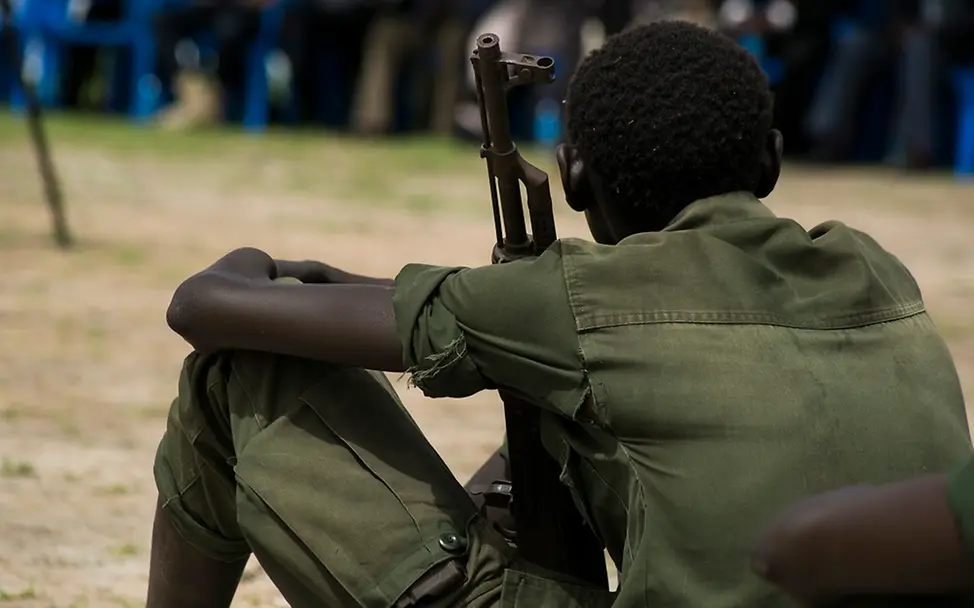
Reintegrating former child soldiers into society is often a very challenging task.
© UNICEF/UN0209623/CholWhat methods do you use to help children overcome their traumatic episodes?
We try to find access to the kids through football, yoga, surfing, music and art. Because we were constantly hitting a brick wall, when we confronted the kids directly with what they've gone through. We needed an entry point for conversation and when we give a canvas for someone to draw, that allows us to start picking up: »Okay, why did you draw this? What is happening here?« When we get kids to try a new activity like surfing or swimming and then trust their partner in the water, we can ask: »When was the last time you felt trusted?« The act of pushing them physically and then creating an entry point for a conversation is new. A lot of actors, ourselves included for a long time, are trying to incorporate psychosocial counselling support into their programs, but it all seems a bit too fouring for what is locally acceptable.
Even in the work with victims of sexual gender-based violence the common belief is that if you survived this atrocity, this trauma, then speaking about it again and unearthing it is weak or ungrateful even.
What do the children paint in art therapy?
It varies, but one thing we have consistently seen is that at the beginning of the program they often paint a battle, a weapon or something that is very gory. And then you see the transformation they are going through also manifesting in the art they are doing. I think art therapy is one of the clearest indications of what is happening in the psyche. Sometimes at the end of the program we also let them cultivate an art show to talk about what is happening here, up until they are drawing something more positive. It's a really interesting approach to look at how someone can communicate something without having to say a single thing.
Thus, the paintings reflect their entire development. You can make an exhibition out of that.
Yes, absolutely. And that has taken us to partner with unconventional actors. We did a collection with a streetwear company in Amsterdam called Daily Paper where some of the drawings that the kids made were put onto T-shirts. That was also an interesting way of getting people that don’t really think on issues like child soldiers or conflict zones to see that “Wow… I feel what this person is drawing” or “I feel connected to it” through mediums that are universal like art and fashion, I guess.
Partnership with UNICEF
As you said in the beginning, your center has a partnership agreement with UNICEF. What is the impact of this cooperation and what does it mean for you?
UNICEF is one of our longest-standing partners, but it is beyond just a donor relationship. Together we advocate for legislation, for reform. We were part of very long negotiations with the federal government of Somalia on the standard operating procedure that was signed, where children have to be handed over within 72 hours. Those kind of cooperations where UNICEF entered an agreement with the government and us as an implementing partner get to actually support the children – it's one that is co-creating solutions and also taking risks on innovating some new interventions. The first care center residential program for child soldiers was something that we believed would be useful. With UNICEF we were actually able to implement and monitor it, put some research behind it. And then UNICEF is also a big advocacy partner for us. It's useful to have that kind of holistic cooperation where it is not just about a donor relationship, but working on systems and longer-term institutional changes, too.
When you work at the Elman Peace and Human Rights Center, the Generation Unlimited Initiative and the Extremely together Initiative you focus on educating and sensitising children and young people on issues like gender violence, equal chances and peaceful paths to fight violent extremism. Why start with children when aiming for peace?
After 30 years of conflict, I often think about how Somalia will become peaceful again. I suppose it is either through great leadership – very strong vision and ability to create reconciliation throughout the whole country – or through a systemic investment in children and thus in the next generation. We don't have the former yet, but we do have the ability to shape minds. And again, the majority of the population in Somalia is very young. That gives me a lot of hope, because that means that we can invest in this very fundamental development that they are going through right now to create these new ideals and to teach and empower them, to prepare them for the leadership roles that they will take on.
I think it's very cliche to say »Children are the future« (laughing), but they really are.
Young people are so eager to learn, to improve their lives, to have a chance at the life that they want for themselves, and they see that that is not conflict and they are tired to be used by unscrupulous war profiteers. So we are trying to enable them to be part of the change that they want to see. I think that really is the only way forward.
The political leadership in Somalia is very male-dominated. How do you make your concerns heard?
By being very loud and annoying (laughing). And persistent. It is still a very male-dominated space, but again, another reason why I think it's so important to invest in youth and children particularly is because they are not as patriarchal;
young people are a lot more inclusive, a lot more gender-equal and a lot more open to having leadership from other spaces.
It's time, I think, for that old kind of »boys club« that the government and leadership used to be to come to an end. Even in societies like Somalia it's encouraging to see that new wave of solidarity that's happening along ideology and along shared ethos, that's happening within young people. The old wave of thinking is starting to slowly fade. But it's something that constantly needs a lot of effort and work. When you're young, when you're a woman in a leadership position, in particular a young woman and then from the diaspora, it's a lot easier to be attacked and to be dismissed. But I think the community that we are building now is stronger than the voices that wanna drown you out.
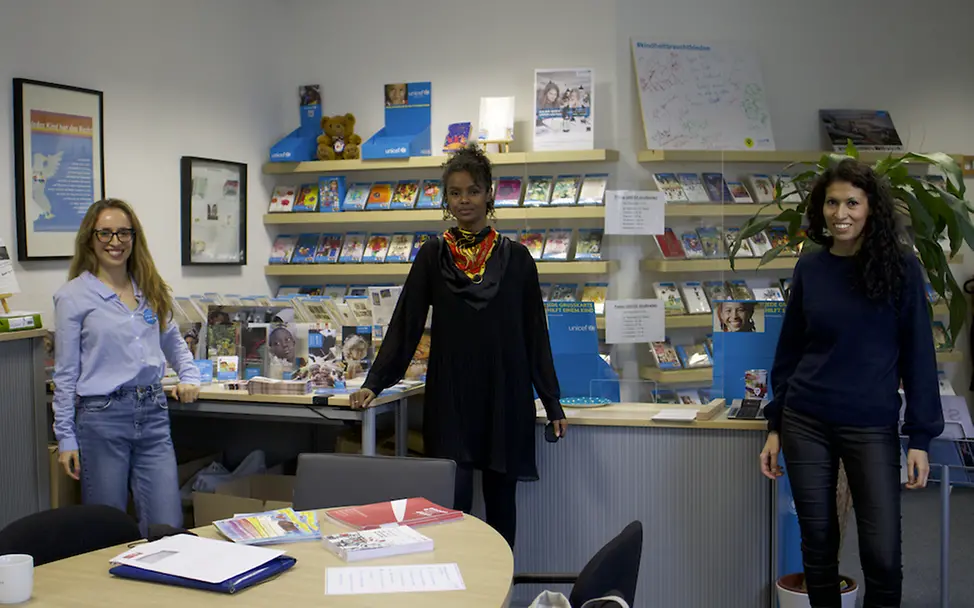
It was an honour to meet you, dear Ilwad!
© UNICEF BerlinBeing an activist for peace and human rights is extremely inspiring, but also a very dangerous path. Many advocates for peace pay for their commitment with their lives. Do you feel that your life is also threatened and where do you get your courage from?
I think that unfortunately working in a conflict zone and being at the forefronts of some of these very difficult issues does come as occupational hazard, but we try to be as smart as possible about it and mitigate as many risks.
But anything worth doing comes with risks and in order to be able to lead at such localizing grassroot level you also have to be exposed.
I think one of the biggest challenges that we face in Somalia is that a lot of great things are happening, a lot of great services, a lot of great interventions, but in silos, because everyone just has this big barricade of walls for security that the people that need to reach them don't even have access to them. You need to be available and accessible and open in order to create the change we need to, but then this also comes with risks. So we try to be as careful as possible, but there is a certain level of fragility. There are risks, there are very real threats, but for now it feels worth it.
What contribution can our volunteer UNICEF group in Berlin do in order to support your peace work for children and women in Somalia?
I think there is a lot that can be done. We are very much at the field level, so direct service delivery, working directly with the community, but there are certain skills that we don't have access to. We are good at what we do – our part, which is actually the part on the ground and working with the communities, but in this digital age that we are in right now there are some skills and capacities that we don't have, that I think that our network of supporters in Berlin or anywhere else in the world can be very useful for us – whether it is digital communications, whether it is through content, content development or storytelling. We are building skills in these spaces for young people so we are also looking for how we can create partnerships for whether it is like virtual skills training or hosting volunteers to come and help us in these spaces. I think there are a lot of ways that we can benefit from that work of support from volunteers. Also how we communicate our messages, how we collect data, how we present that. It's not always about fundraising the kind of support that we need, but also about transferring certain skills to help us connect with big audiences around the world.
To hear about the work done in the field and the great, immense impact it has on children and women in Somalia is really a huge inspiration. Your work and conviction are so important - and they are basically the reason why we are at UNICEF. Advocating for children’s rights, support and development, equal chances for every child, end of violence and first and foremost peace. Everything you told us of your work is truly inspiring. Thank you, Ilwad Elman!
Thank you so much.
The interview was moderated by Ajda Omrani and Ina Georgieva (UNICEF Berlin).